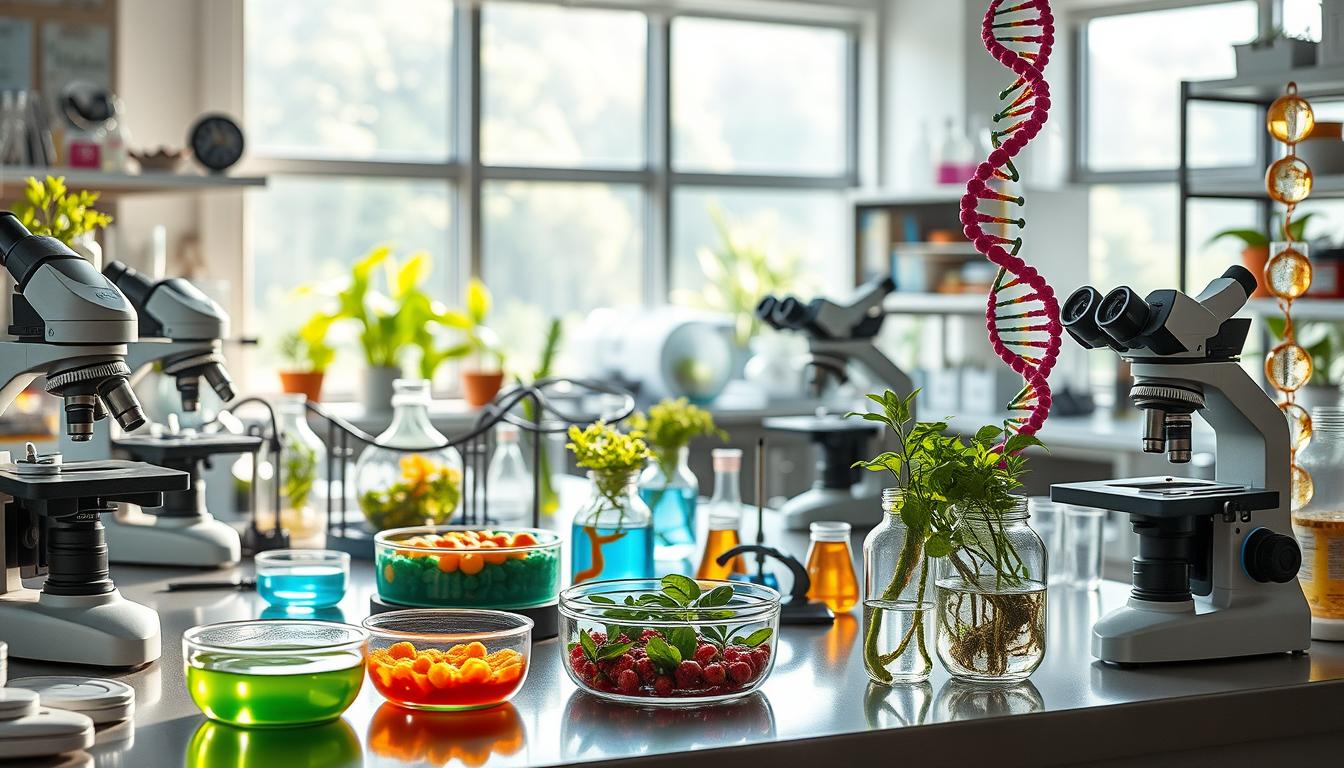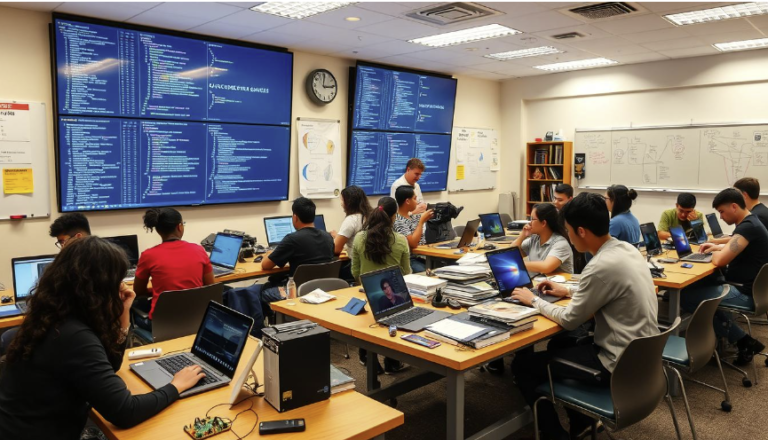Associate Degree in Biology
Introduction
Explore the wonders of life with an Associate Degree in Biology. This program gives you a strong base in life sciences. You’ll learn about molecular biology, genetics, and more.
Through lab work and classroom learning, you’ll grasp the science of life. This prepares you for many careers in healthcare, research, and environmental fields.
Key Takeaways
- Comprehensive coverage of core biological concepts and principles
- Hands-on laboratory experiences to apply theoretical knowledge
- Preparation for diverse career opportunities in the life sciences
- Solid foundation for further education in biology-related fields
- Develop critical thinking and problem-solving skills
Exploring the Fascinating World of Biology
An Associate Degree in Biology opens up the world of biology. Students dive into molecular biology and genetics. They learn about life’s secrets and how traits are passed down.
Molecular Biology: Unraveling the Secrets of Life
The program looks at DNA, RNA, and proteins, the basics of life. Students understand how life works, from genes to cells. This knowledge is key for studying biochemistry, evolution, and physiology.
Genetics: Decoding the Blueprint of Inheritance
Genetics teaches how traits are inherited. Students learn about Mendelian genetics and DNA. They get good at analyzing genetic data, which helps in understanding evolution and physiology.
“The study of biology is a journey of discovery, revealing the intricate tapestry of life and the remarkable adaptations of living organisms.”
Students in the Associate Degree in Biology program learn through experiments and discussions. They gain a deep respect for life’s complexity. This prepares them for careers in molecular biology, genetics, biochemistry, evolution, and physiology.
Career Pathways for Biology Graduates
An Associate Degree in Biology opens many doors. It leads to careers in biotechnology, research, and healthcare. Biology graduates find jobs in labs, pharmaceutical companies, and environmental agencies.
Biotechnology: Harnessing the Power of Living Systems
In biotechnology, biology graduates help create new solutions. They work on improving health, agriculture, and the environment. Their skills in molecular biology, genetics, and biochemistry are valuable.
- They help in drug discovery and clinical trials in the pharmaceutical industry.
- They work in research labs, pushing scientific boundaries.
- They help develop healthcare solutions like personalized medicine.
An Associate Degree in Biology also prepares students for more education. It’s a stepping stone to bachelor’s degrees in medicine, veterinary science, or environmental science. This way, graduates can make a big difference in the world.
Biology: A Gateway to Diverse Opportunities
An Associate Degree in Biology opens doors to many careers. You can work in ecology, zoology, botany, and microbiology. These fields help us understand and protect the natural world.
With an Associate Degree in Biology, you gain skills for many jobs. You can work in environmental conservation or public health. The life sciences offer many chances for those who love nature and its systems.
Here are some career paths you can explore with an Associate Degree in Biology:
- Environmental Scientist: Conduct field research, analyze data, and develop strategies to protect ecosystems and natural resources.
- Wildlife Biologist: Study the behavior, habitats, and populations of animals, contributing to conservation efforts.
- Botanical Researcher: Investigate the growth, reproduction, and diversity of plants, aiding in the development of agricultural practices and sustainable forestry.
- Public Health Microbiologist: Identify and monitor the spread of infectious diseases, supporting disease prevention and control initiatives.
An Associate Degree in Biology offers endless opportunities. It prepares you to make a difference in the life sciences. Whether you’re interested in the outdoors or the microscopic world, this program has you covered.
| Potential Careers | Job Description | Median Salary (U.S.) |
|---|---|---|
| Environmental Scientist | Conduct research, analyze data, and develop strategies to protect the environment and natural resources. | $73,230 |
| Wildlife Biologist | Study the behavior, habitats, and populations of animals, contributing to conservation efforts. | $66,350 |
| Botanical Researcher | Investigate the growth, reproduction, and diversity of plants, aiding in the development of agricultural practices and sustainable forestry. | $69,400 |
| Public Health Microbiologist | Identify and monitor the spread of infectious diseases, supporting disease prevention and control initiatives. | $72,840 |
“An Associate Degree in Biology is a gateway to a world of opportunities beyond the traditional healthcare or research fields. The versatility of this program empowers graduates to make a real difference in preserving and understanding the natural world.”
Conclusion
The Associate Degree in Biology opens doors to many opportunities in life sciences. Students learn about molecular biology, genetics, and biochemistry. This knowledge prepares them for careers in healthcare, research, biotechnology, and environmental protection.
This program helps students understand the science of life deeply. It also improves their critical thinking, problem-solving, and lab skills. These skills are crucial in the changing world of life sciences.
An Associate Degree in Biology is a great start for many careers. It’s perfect for those interested in medicine, biotechnology, or environmental work. Biology graduates are in high demand as life sciences shape the future and drive innovation.
With this degree, biology graduates can make a big difference. They help advance scientific knowledge and improve life for many. The future may bring challenges, but with the right skills and passion, the possibilities are endless.
FAQ
What is an Associate Degree in Biology?
An Associate Degree in Biology gives you a strong base in life sciences. It prepares you for many careers. You’ll learn about molecular biology, genetics, and more.
What will I learn in the Molecular Biology and Genetics courses?
Molecular biology dives into how living things work at a small scale. It looks at DNA, RNA, and proteins. Genetics teaches you about heredity and how genes affect living things.
What career opportunities are available for Biology graduates?
Biology graduates have many career options, especially in biotechnology. They can work in labs, pharmaceuticals, or environmental agencies. This degree also helps you get into medicine or environmental science.
Are there any non-traditional career paths for Biology graduates?
Yes, Biology graduates can explore many careers beyond healthcare or research. They can work in ecology, zoology, or conservation. This degree gives you skills for many fields.





